Pillars of Eternity II [Official Site] released earlier this week and I was only able to share some basic thoughts about the experience. Now, with more time sunk into the game I have a more nuanced perspective I can talk about.
Note: Key provided by publisher.
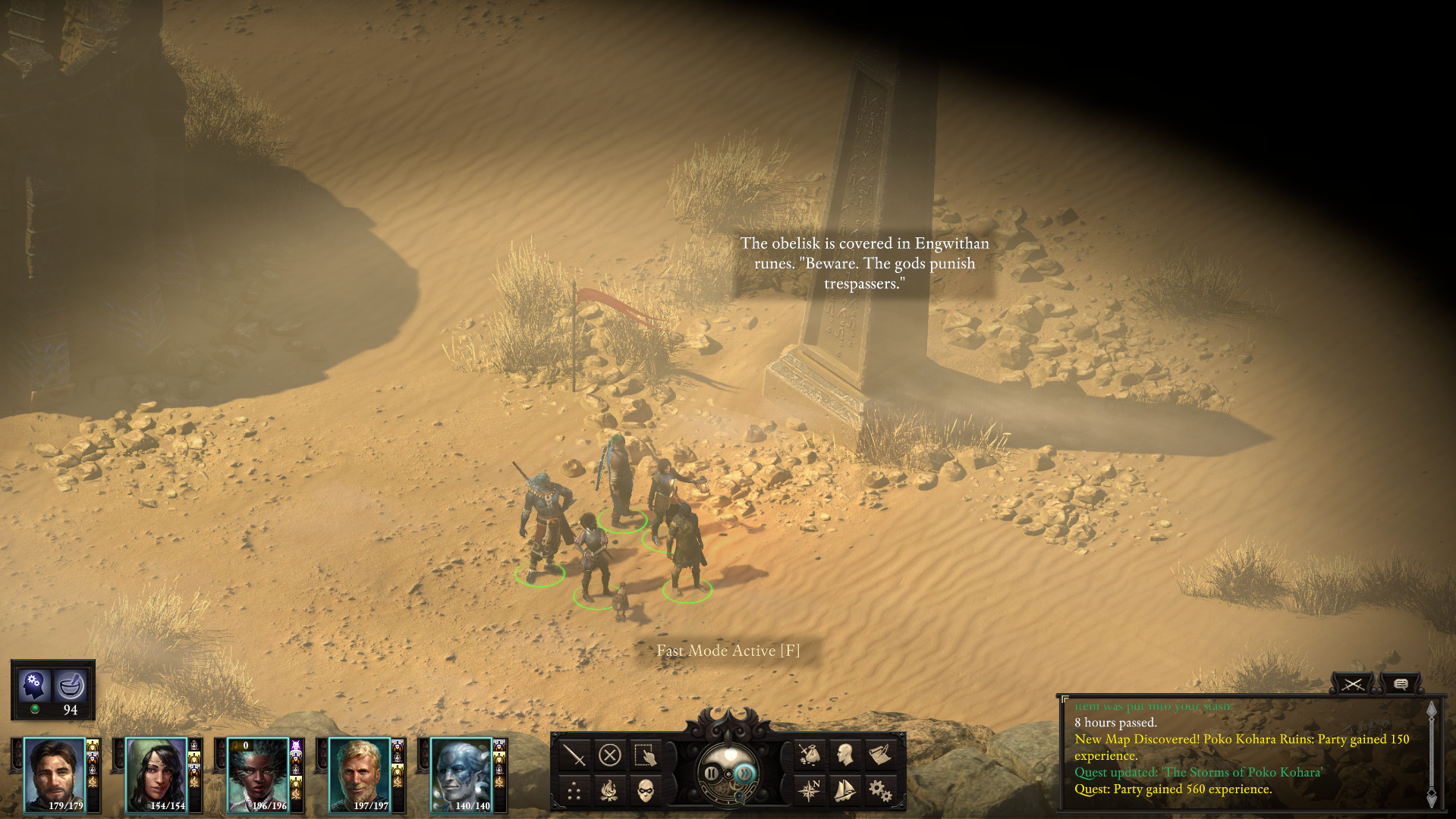 Returning to the role of the Watcher is easy. Between the time The White March Part II released and Pillars II finally came out, I’ll have to admit that I had forgotten about a lot of the things my character had done. Obsidian eases you into the role in this direct sequel by adding little bits and bobs of information without overwhelming you, more garnishing than anything too hefty to process. It helps that right from the beginning you can redefine your legacy; not only can you import a save file from the first game, but you can also choose presets of your would-be choices and tweak things to your satisfaction.
Returning to the role of the Watcher is easy. Between the time The White March Part II released and Pillars II finally came out, I’ll have to admit that I had forgotten about a lot of the things my character had done. Obsidian eases you into the role in this direct sequel by adding little bits and bobs of information without overwhelming you, more garnishing than anything too hefty to process. It helps that right from the beginning you can redefine your legacy; not only can you import a save file from the first game, but you can also choose presets of your would-be choices and tweak things to your satisfaction.
Familiar faces return in the form of companions, NPCs and the gods themselves. The game always allows you to catch your breath and to figure out what your relationship to them was before allowing you to decide what it will be. It’s always something of a balancing act in sequels between too much and too little information but I think that the game mostly gets it right. I ended remembering the important parts but, more importantly, I think that even if you skipped the first game you wouldn’t be adrift in too much jargon and information. Deadfire borrows from its cousin Tyranny and key words are highlighted in the dialog that tell you more of the game’s lore and that lets you keep track of concepts you might have forgotten.
In these story and dialog-heavy games, the quality of the writing makes a huge difference on how you’ll feel about the game. I don’t really have much in the way of complaints for the average quest and non-player character; there are reasonable amounts of choices, covering what different kinds of player characters might say, and it feels natural and easy to absorb. My suspension of disbelief was only slightly broken by the few questionable choices for voice acting but I got what everyone was about and I certainly felt agency from my choices when it came to dealing with them.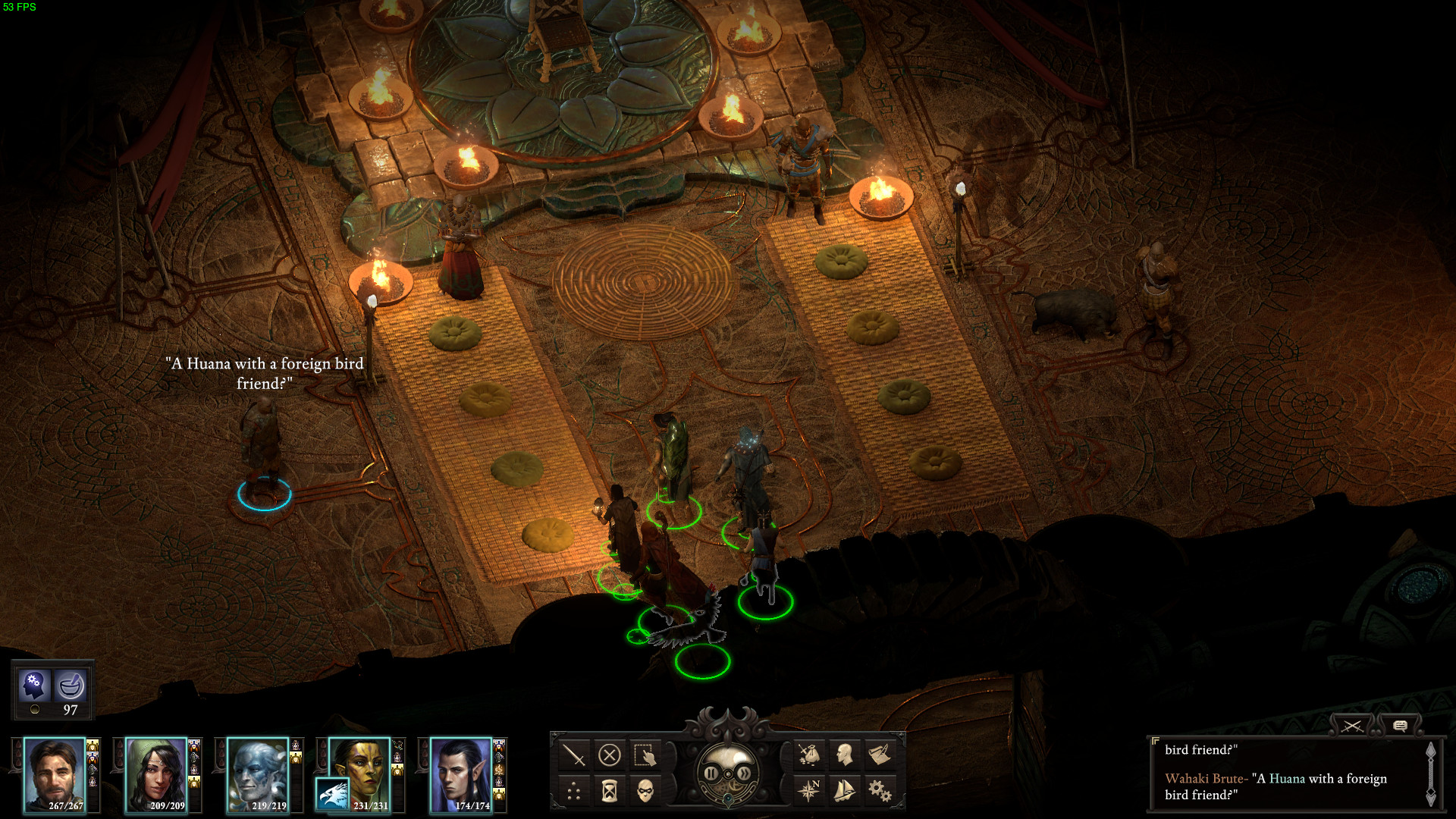
The same can’t really be said about the companion characters you might recruit into your party. I can’t think of a single story arc that culminates in a character quest that made a lasting impression on me. It feels so ancillary, writing-wise. Instead of being more closely integrated to the main story and narrative struggles the party suffers, the character growth is only really notable at the very end of the game. There are certain attitudes that each character holds that affects their relationship, not only with yourself, but with other party members so I couldn’t help but feel a little disappointed that that aspect of the game seemed a little too mechanical. Two or three times party members got into verbal spats but I few simple words from me resolved that conflict seemingly forever. Sure, it’s all very grown up of everyone but a little more petulance here and there would be more human.
Pillars II goes further than many other Obsidian titles and allows the protagonist to form romantic attachments with any party member. I can’t say that it’s something that was very satisfying to experience. Chances to start a relationship seem to come out of the blue and there’s nothing more to it than saying yes at the right moment. Travel enough with a companion and it just happens. Once involved with someone, there’s pretty much no difference in behavior. I can only recall about two times in the whole of the game where dialog was affected by the fact that I was involved with a companion. It wouldn’t be so odd if everything else about companions didn’t affect dialog—they’ll happily pipe in with their opinions on whatever topic is being discussed in most conversations. As a result, it’s an aspect of the game that comes off feeling underdeveloped. I’m not saying that I needed full-blown dating sim aspects, but it doesn’t feel like there’s much that’s gratifying or interesting about getting involved with someone.
There’s more to enjoy in the general story and setting, however. The central entanglement with Eothas and the other gods kept my attention and offered a few interesting conundrums for my Watcher. That said, I was far more interested in the Deadfire Archipelago itself. There’s a lot of intersection of political needs with economics and development that sets the various factions at odds with one another. The game doesn’t really take a stand one way or another on much of the colonialism that’s taking place but it does offer the player an opportunity to get involved and steer the direction future developments will be going. It’s way more lively than the factions in the first game and players can play most of the sides up against each other for most of the game. My only real complaint is that this dynamism dies down abruptly as the game lurches towards a conclusion and it loses a lot of the nuance of beliefs in service of wrapping things up neatly.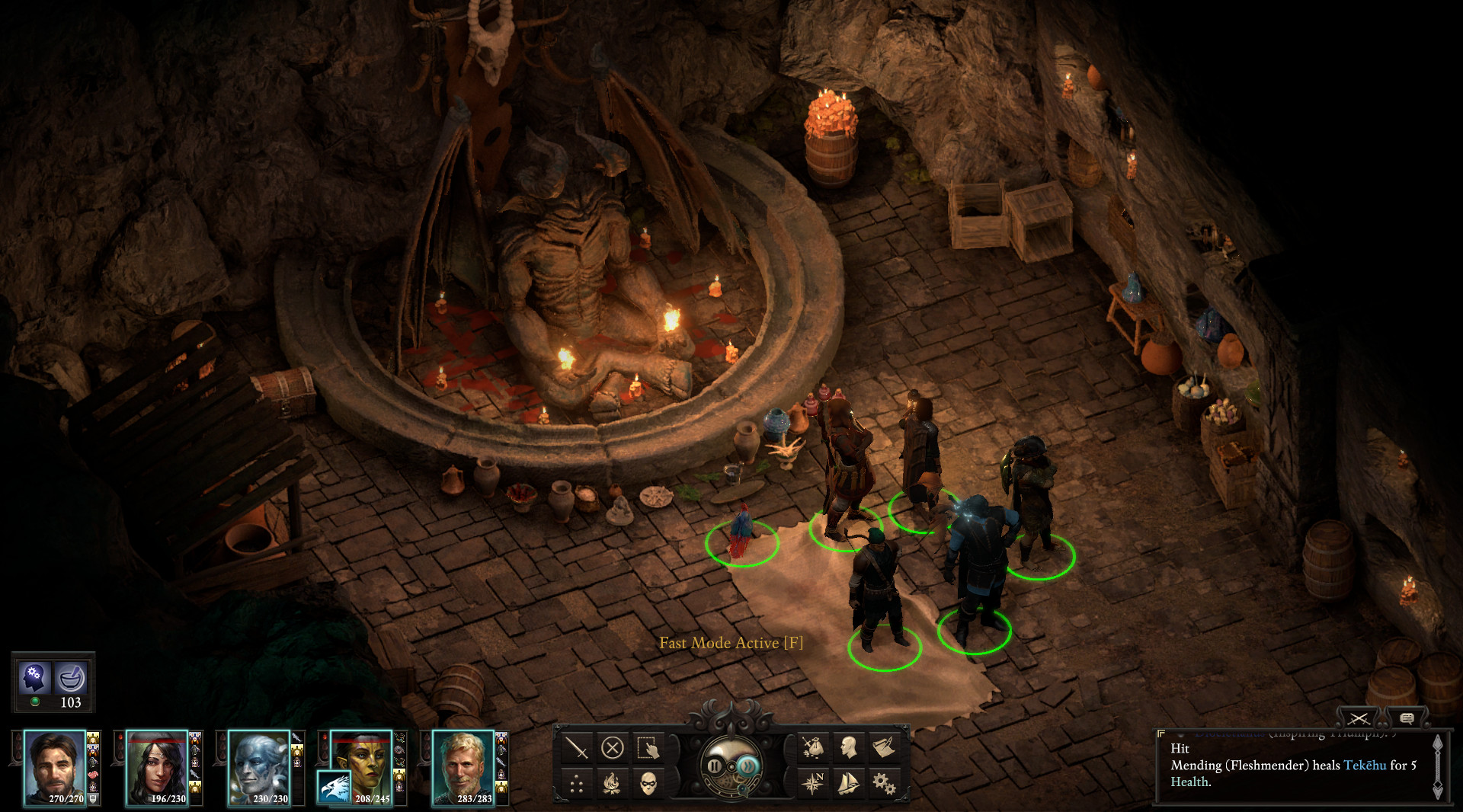
It might seem odd to complain about something that should seem so obvious in an RPG like this but the presentation and substance of the game made me hope that endings and destinies were a little more open-ended. Nearly from the outset of the game you’re able to go virtually anywhere on the map. Sailing the oceans and taking quests in any order that you like builds upon expectations in a way that I didn’t feel with other similar games. It’s fun to discover islands and all those side dungeons and events you get from exploring the wild. Bigger settlements like Neketaka also are full of detail and areas you can get lost in. It’s entirely possible to spend hours ignoring more important quests for the petty dramas of more normal people. If you’re the type of person who likes to have his hand held, it can be daunting to get your head wrapped around where you have to go or what you have to do, but I enjoyed exploring and going wherever I wanted so much that I think it’s one of the strongest features of the game. So whenever the game does return to linearity it ended up feeling like a bit of a downer.
Combat and skills have gotten a rework since the first Pillars. There’s highly-tweakable party AI and understanding how abilities and equipment work is simple. Other than a fight or two that might be mandatory, most of the game can be accessed with other skills. Stealth and sneaking is made more useful and easy to understand, sure, but there are also things like interacting with objects, discovering alternate paths and even using certain abilities in places that can change how an area plays out. For my first game I chose to spend most of my time being a diplomat and talking my way out of things, and I was pleased that a large proportion of situations were solved peacefully even when it seemed like it would be impossible to. I also saw plenty of opportunity to be duplicitous or a jerk and get ahead as well as chances to be crafty and outwit people.
It’s only systems related to your ship that feel poorly constructed. Ship management and keeping crew morale up isn’t hard but it’s uninteresting as there’s little reward in it. There are little skits and events with them that you occasionally get when traveling but they’re few and lack much variety. Ship combat is worse and can be outright aggravating. As you might expect, players give out orders, turn the ship, fire cannons and manage the crew per turns in the hope of sinking the opponent. The main problem is that it’s its own self-contained minigame. If you use grapeshot to clear the crew and then board, you’ll still find the same number of perfectly healthy enemies that you would have faced if you had just boarded right away. AI ships also heal up completely the moment battle is ended, meaning that if you manage to whittle down a ship to low hull strength, if they manage to then run away, the next time you face them it’ll be as if nothing you did mattered. And yet the damage they do to you is persistent and must be fixed. So if an enemy runs away and you re-engage right away, you’ll be at a bigger disadvantage. By the end of the game I preferred to ignore naval combat entirely and simply rush in full sails ahead to board the enemy ship as soon as possibly. It was just faster and less finicky that way.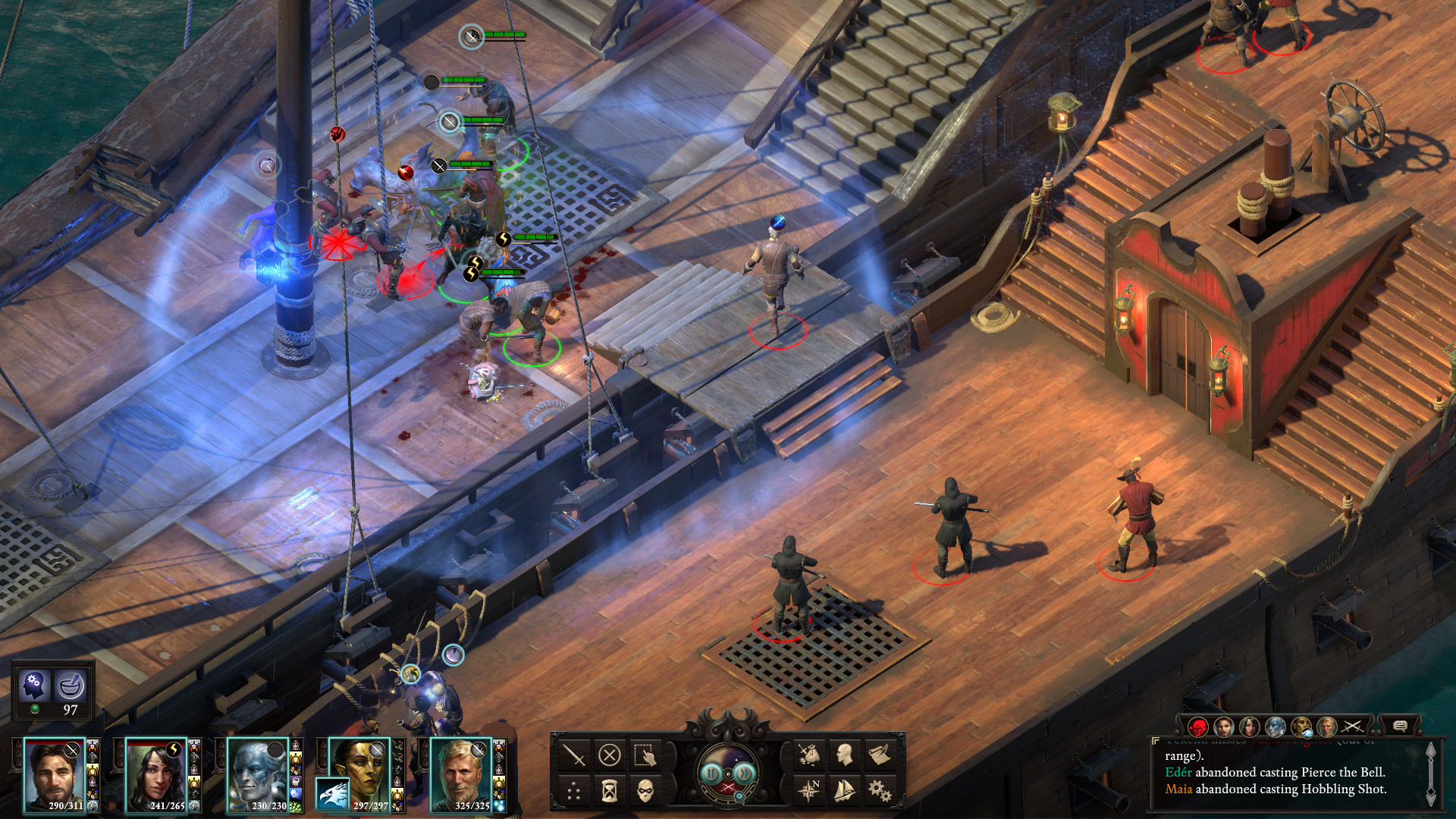
I should also take a moment to briefly talk about the art and music of the game. Locations are beautiful with lush rain forest, dusty deserts and bubbling volcanoes alike being vibrant and full of activity. Things like lighting and water effects look outright stunning and exploring dungeons and places full of danger never looked quite so good. The sketches that show up when you’re interacting with an object or when you’re exploring parts unknown also have a real pen-and-paper feel to them, like something right from an old dungeon master’s guide. A lot of care was clearly put into the visuals, which is matched by the care put into the score. While there’s no one piece that stands out, it does feel very harmonious with the rest of the game. When I stopped to really listen I appreciated how well it paired with the exploration and environs. Oh, and sea shanties while sailing are also a really nice touch. Nothing like hearing your crew singing of grog, gods and fortune to get you in the mood for exploring uncharted lands.
I’ve taken some time to reflect about my journey in the Deadfire and I've come away enjoying my time thoroughly. Clearly it’s a game made by veterans of the genre, ones whose confidence in their vision and writing helped craft a less disjointed story this time around. I felt a clear willingness to embrace more of their lore and have fun with it instead of relying on a more somber and overly-serious tone than the first Pillars. The gods may be jerks still, but they’re presented in ways that are easier to relate with than the first time around. Most companions didn’t click with me, perhaps with the exception of Edér and his issues with Eothas, but I can appreciate that they at least tried to do something slightly with some of the new faces. How Maia and Tekēhu and how their outlooks of and relationships to the factions vying for control of the archipelago develop comes to mind. These foundations, coupled with the general improvements in mechanics, are a metric I feel comfortable using to say it's a game that's overall superior to its predecessor.
With that said, there are some caveats that could put people off. For example, it’s not a game that would draw in newcomers that easily. As well as the choices from the previous game are explained and integrated, I can see new players feel a little overwhelmed by the weight of the in-game history. Combined with the open nature of the game, it could also be hard for them to decide what they should be doing and, most importantly, why. Some part of this is due to the limited nature of the quest journal; it could use more options for filtering and sorting quests and people.
For those who persist or are coming back to the series with positive expectations, however, I think that they’ll find an engaging and delightful adventure waiting for them. I can only hope that Obsidian will take stock of what worked and what didn’t and apply it to their future games. Warts and all, I enjoyed my time in the Deadfire and there’s very little else that’s available to play that matches the scope and loving attention to detail found in the game.
You can get Pilalrs of Eternity II: Deadfire on Obsidian’ shop, GOG, the Humble Store or Steam.
I've been playing this game lately and I'm completely sucked in by it. Took me a bit to get used to the combat and the points system, but really enjoying it, especially the exploration.
Never played the first PoE, should I play it first or should I skip directly to PoE II?
No reason to skip number one really. If you like II you would probably like number 1.
In saying that I'm only 'trialing' Pillars 2, and it isn't sucking me into the world, doesn't look any graphically better either, even has aliasing bugs. I might wait a while until it goes on special. Also it seems to pay playing through the white marsh series which I didn't do.
Seems I'm a expert at losing savegame files, I had a 3TB drive of backups once, got all corrupted... :(
PS. This game is pretty much baldur's gate.
Last edited by TheRiddick on 14 May 2018 at 2:44 am UTC
Never played the first PoE, should I play it first or should I skip directly to PoE II?
I'd say play the first PoE while waiting for bugs to be squashed and DLC to be released in PoE II ;) If you enjoy CRPG, there's really no reason to skip the first one, and you'll get a much better feel fore the lore.
Besides, it's plain and simple a great game imo. Oh, and Tyranny ([Steam](https://store.steampowered.com/app/362960/Tyranny/) / [GOG](https://www.gog.com/game/tyranny_commander_edition)) while you're at it! Such an underrated gem!
In the options of PoE 2, you can create your own "history" of what happened in PoE 1 - that helps to understand a lot of references made in PoE 2.
I must say I really like the improvements to the character system, especially the multi-classing.
Obviously not something for newcomers, but veterans of the genre will absolutely love to create something unusual like a warrior/mage that uses magic instead of heavy armor to buff themselves during combat.
Last edited by TheSHEEEP on 14 May 2018 at 6:34 am UTC


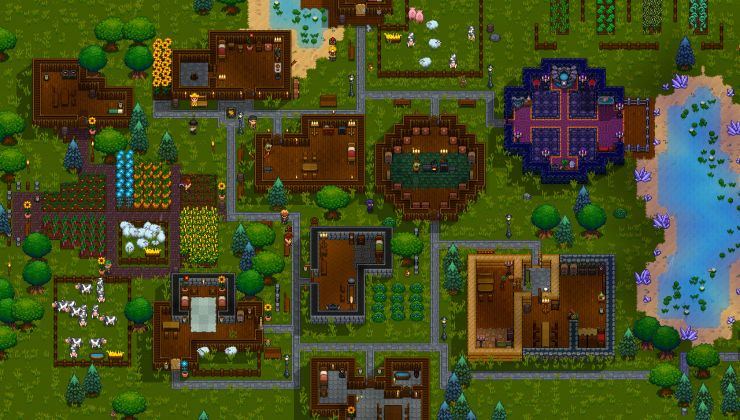
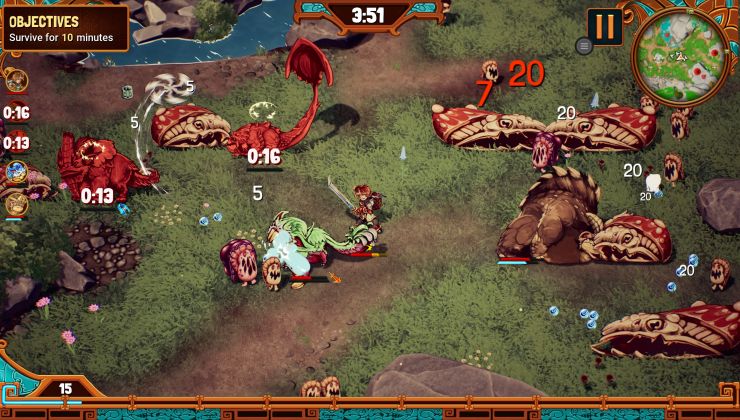






 How to set, change and reset your SteamOS / Steam Deck desktop sudo password
How to set, change and reset your SteamOS / Steam Deck desktop sudo password How to set up Decky Loader on Steam Deck / SteamOS for easy plugins
How to set up Decky Loader on Steam Deck / SteamOS for easy plugins
Oh and the name doesn't mean anything but coincidentally could be pronounced as "Buttery" which suits me just fine.
See more from me